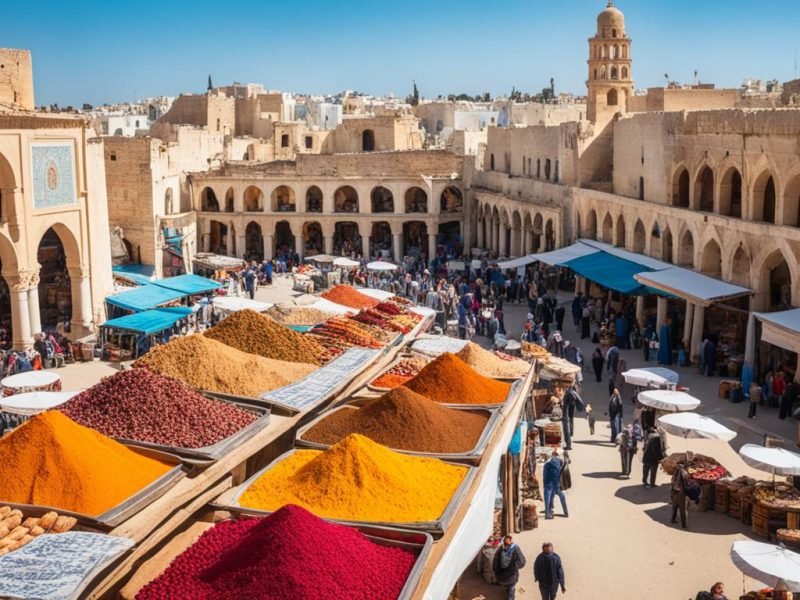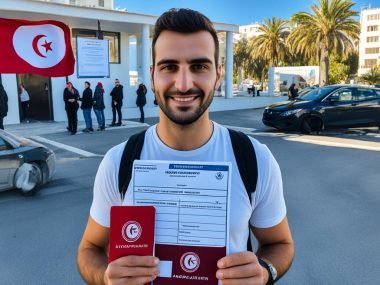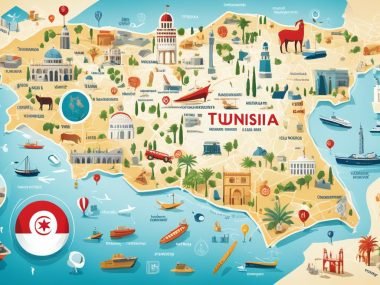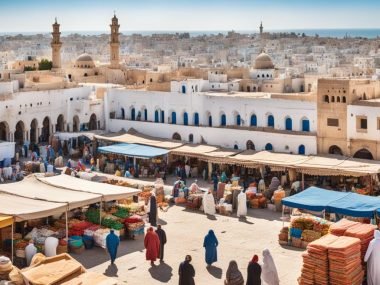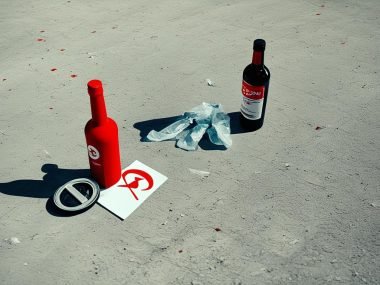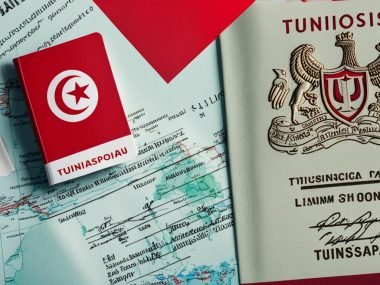Did you know Tunisia draws over eight million tourists yearly? They come for its lovely Mediterranean beaches and the Sahara Desert. Tunisia is a treasure with history, culture, and natural beauty. Before going to this North African paradise, you need to know a few tips for a great visit.
You must have a valid passport, issued six months before traveling. Also, visa rules depend on where you’re from, so check them early. It’s smart to look up health advisories too. Knowing all about travel in Tunisia makes your trip better.
Key Takeaways
- Ensure your passport is valid for at least six months before travel.
- Check visa requirements tailored to your nationality prior to your departure.
- Stay informed regarding current health advisory notices.
- Consider travel insurance for added peace of mind.
- Familiarise yourself with local customs and cultural norms.
Introduction to Tunisia
Welcome to Tunisia, a place full of ancient history and stunning scenes. It is known for its lively cities, green valleys, and oases. It also has famous historical sites from old times.
Historical Background
Tunisia’s past is rich with many cultures like the Berbers and Romans. The Carthage ruins show its early glory. From old theatres to Arabic medinas, Tunisia attracts people from everywhere.
Geography and Landscape
The country has the great Atlas Mountains and the Sahara Desert. Between them are green valleys and oases, like bits of heaven in a dry land. Its fertile lands and coasts add to its beauty.
Tunis, the capital, is a lively city. It blends old and new perfectly. Ancient streets mix with modern buildings, showing different times together.
Visa Requirements for Tunisia
Planning a trip to Tunisia? Knowing the visa rules is key for a smooth visit.
Passport Validity
Your passport must be valid for six months after you enter. A ID card won’t work for entry. Make sure your passport is ready and fits these rules.
Visa Exemptions
Some travellers don’t need a visa for short visits, up to 90 days. But, if your country isn’t visa-exempt or you’re staying longer, you must apply for a visa.
Health documents aren’t needed right now for Tunisia. Still, it’s smart to have travel medical insurance just in case.
Important Tunisia Travel Tips
Planning your trip to Tunisia well ensures a smooth and safe journey. Here are key tips to help you prepare.
Travel Insurance
It’s crucial to get travel insurance before going to Tunisia. Good travel insurance covers medical problems, trip cancellations, and theft. Because of Tunisia safety and security, pick a plan that works even if travel advice changes. Always check your insurance details to match your travel needs.
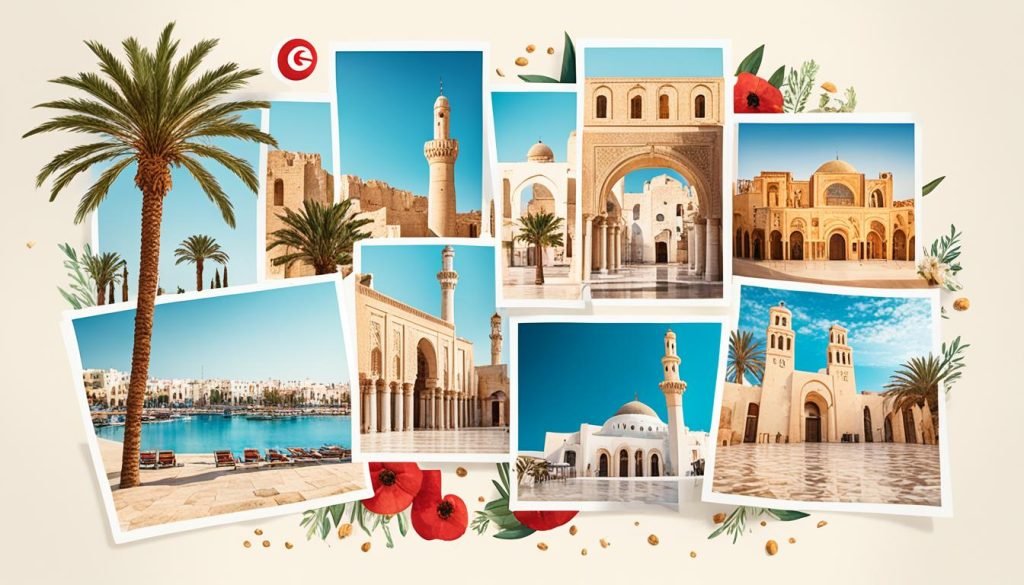
Customs Rules
Knowing Tunisia’s customs rules is key to avoiding trouble. You must declare items like a lot of money, electronics, and certain meds. It’s vital to listen to local advice because warnings about travelling to parts of Tunisia consider security and health.
The FCDO says to be careful about Tunisia safety and security. Staying away from risky areas helps you follow the law and travel safely.
Understanding Tunisia Cultural Norms
Learning about Tunisia cultural etiquette makes our visit worthwhile. It helps us respect and appreciate Arab culture in Tunisia. When we arrive in Tunisia, it’s important to act respectfully. This builds good relations with locals.
In Tunisia, it’s good to dress simply, especially outside the cities. In places like Tunis, rules are a bit relaxed. But covering up shows respect. We should also be quiet and not too open in our affection in public places.
Helping the environment is also key. We can do this by using less plastic. And if we can, we should recycle to keep Tunisia beautiful.
Talking with local people lets us see their way of life. Being polite and showing interest in their culture is important. Simple actions, like shaking hands properly, mean a lot to them.
Understanding religious beliefs is also important in Tunisia. We should know when people are praying. And not eat or drink in public during Ramadan.
To wrap up, respecting Tunisia cultural etiquette improves our trips. It encourages good, respectful tourism. By following local ways, we help make sure everyone gets along well.
Tunisia Safety Tips
Tunisia is a welcoming destination, with a low crime rate and friendly locals. But, staying alert about safety can make your trip smooth. We’ve got some tips to help you.
General Safety Measures
Tunisia’s crime rate is low, but it’s smart to be careful. Keep your things safe and stay alert in busy spots. Crowded areas like markets and buses need extra caution.
Avoid walking alone when it’s dark. For taxis, always pick licensed companies.
Areas to Avoid
Some parts of Tunisia should be avoided for safety. The borders next to Algeria and Libya are risky. This is due to dangers from cross-border terrorism.
The FCDO says not to go to these areas. Staying updated on travel advice and local news helps lower risks.
Tunisia Weather Forecast
The Mediterranean climate of Tunisia gives you warm summers and mild springs. Autumns are mild too, and winters are a bit cooler. Knowing the seasonal weather in Tunisia makes trips more fun and comfy.
Summer brings warm, sunny days good for beach trips. You should wear light clothes and use sunblock. When autumn and spring come, it’s cooler but still nice for going out. Wear comfy shoes and layers for the changing day temps.
Winter is cooler but nice for visiting, especially down south. Wear jackets and warm clothes to keep cosy. Understanding seasonal weather in Tunisia helps plan better. This makes your visit more comfortable.
| Season | Typical Weather | Suggested Activities |
|---|---|---|
| Summer | Warm and sunny | Beach visits, coastal sightseeing |
| Autumn | Mild temperatures | Historical site exploration, city tours |
| Winter | Cooler but pleasant | Desert trips, indoor cultural activities |
| Spring | Mild temperatures | Outdoor excursions, flora and fauna viewing |
Knowing the seasonal weather in Tunisia helps us pack right. We can enjoy every moment, from summer beaches to cool historical sites. Tunisia’s weather makes it a great place to visit any time.
Tunisia Currency Exchange
Knowing how to exchange money in Tunisia is very important. This is because Tunisia has strict rules about its money. You might use ATMs or change money at special places. It’s key to know how Tunisian money works to avoid any money troubles.
Using ATMs
You can find ATMs in big cities and places where tourists go. It’s key to keep any bank receipts when you get money. You need these if you want to change Tunisian money back to your own before you leave. You can’t take Tunisian money out of the country. Always be safe when using ATMs. Look for ones in safe places to stop fraud.
Currency Regulations
Tunisia has strict rules to manage its money well. You can’t bring Tunisian money into or out of the country. So, if you have any money left, change it before you go. Don’t forget you need your exchange receipts. Also, don’t bring drones unless you have permission. Following these rules is very important.
| Aspect | Details |
|---|---|
| ATM Usage | Widely available, keep receipts |
| Currency Export | Unspent dinars must be converted back |
| Drone Importation | Requires proper authorisation |
Exploring Tunisia Local Cuisine
Tunisian cuisine takes you on a fantastic journey, mixing Mediterranean and North African tastes. It’s a must for anyone visiting Tunisia to dive into this rich culture. You’ll explore diverse traditions through their food.
Must-Try Dishes
There are some dishes you can’t miss in Tunisia. Couscous is often seen as the national dish. It is made with vegetables, meats, and spices. Tajine is another must-try. Unlike Morocco’s, it’s more like a baked omelette with various fillings.
Eating Etiquette
Eating the right way is key to enjoying Tunisian meals. You should eat with your right hand. Sharing food is common, showing the friendly side of Tunisian meals. It’s also good manners to stay seated until everyone is done eating. Respecting these practices shows you value Tunisian culture.
Eating in Tunisia is special, whether at a lively market or a quiet inland restaurant. The spices and kind service make it unforgettable. Tasting the local dishes is surely a highlight of visiting this lovely country.
Top Tunisia Tourist Attractions
Tunisia is full of wonders, from old ruins to lovely beaches. We can see ancient places and chill on pretty beaches in this exciting country.
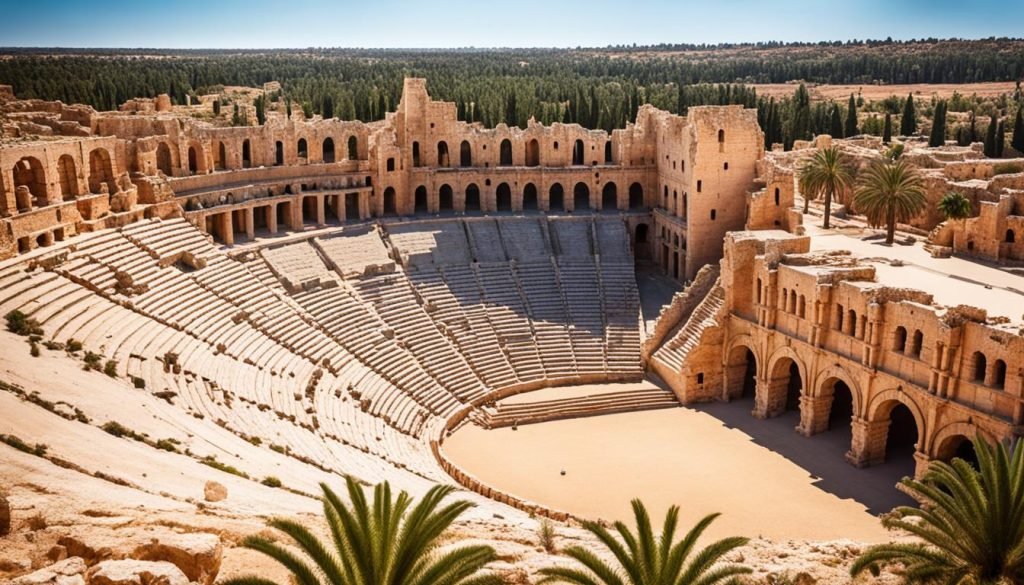
Carthage
Carthage is a key historical site in Tunisia. It’s perfect for those who love history. These old ruins share stories of the great Carthaginian Empire. They let us peek into the past. Walking through these ruins, we feel the greatness of old times.
Hammamet
Hammamet is great for relaxing and lovely beaches. It’s known for clear waters and fun nights. It’s the best place for sunbathing, water sports, and tasty seafood by the sea.
Djerba Island
Djerba Island is known for calm beaches and deep culture. As one of the magical beach destinations in Tunisia, it offers more than just beaches. Here, we can see old mosques, lively markets, and experience the mix of Berber and Mediterranean culture that makes this island special.
Tunisia has something for everyone, whether it’s exploring history, experiencing culture, or relaxing by the sea. It is a great place for all kinds of travellers.
Tunisia Language Basics
Learning basic Arabic in Tunisia shows we respect their culture. Though many speak English in tourist spots, knowing Arabic phrases makes our trip better. It helps us connect with Tunisian people.
Common Phrases
Learning a few Arabic phrases is helpful. Here are simple language tips for Tunisia. These tips help in daily chats:
- As-Salaam-Alaikum (Peace be upon you) – A common greeting
- Shukran (Thank you) – For saying thanks
- Min Fadlak (Please) – To be polite
- Naam (Yes) / La (No) – For yes or no answers
- Kam Thaaman? (How much?) – Handy when shopping
Language Etiquette
Following language rules shows we value Arabic in Tunisia. Let’s look at some key etiquette tips:
- Respect Formalities: Start talks with polite greetings.
- Use Appropriate Gestures: Body language is important too. Smiling or nodding is good during chats.
- Be Patient: Stay calm if it gets hard. Tunisians like when we try to speak Arabic, even if it’s not perfect.
- Cultural Sensitivity: Understand their culture. For instance, don’t use the left hand to eat or hand over things.
Knowing these phrases and etiquette helps in our travels. It shows our real respect and effort to learn about Tunisian culture. These tips let us enjoy our visit more.
Conclusion
As we end our look at Tunisia, it’s key to plan well for a great trip. Knowing about visas, passports, and safety is important. Learning about the culture and language makes your trip better and shows respect to locals.
Tunisia has amazing places and a lively culture. You can see historic sites like Carthage or beautiful beaches in Hammamet. Trying local food and following cultural rules makes your trip real and special.
To sum up, good planning makes a trip to Tunisia better. You’ll enjoy its history, beauty, or tasty food. Let’s travel with care and respect, creating memories to treasure forever.

